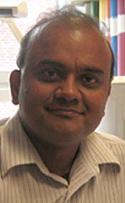SWEDISH SOUTH ASIAN STUDIES NETWORK
Division of Medical Inflammation Research (MIR), Dept. of Medical Biochemistry and Biophysics (MBB), Karolinska Institutet Medical University, Stockholm
Postal address: Institutionen för medicinsk biokemi och biofysik (MBB), Karolinska Institutet, SE-171 77 Stockholm
Visiting address: Scheeles väg 2, Entrance B 2, third floor
Web pages: http://www.inflam.mbb.ki.se/ &
http://ki.se/ki/jsp/polopoly.jsp?d=20686&l=en
 Contact person: Assistant Professor Kutty Selva Nandakumar, phone: +46 (0)8 524 87715. Personal web page
Contact person: Assistant Professor Kutty Selva Nandakumar, phone: +46 (0)8 524 87715. Personal web page
Medical Inflammation Research (MIR) is one of the 10 divisions within MBB. It is currently located in the Scheele house (main lab with all animal model work) and the Center for Molecular Medicine (CMM) – with all clinical part of the research.
South Asia related research
Dr. Kutty Selva Nandakumar has a double PhD degree, first defending a thesis on the importance of porin, an outer membrane protein, in murine and human typhoid at Madurai Kamaraj University in Madurai, India in 1996. Ten years later, in 2006, he defended a PhD in Immunogenetics at Lund University, with a thesis titled ”Analysis of effector pathways in arthritis”. He moved to Karolinska Institutet in July 2008.
In November 2008 Dr. Nandakumar received 600 000 SEK as a research grant from the Swedish Research Links (Asian–Swedish research partnership programme) for an Indo-Swedish collaborative project titled ”Analysis of Host Response to Modified
Biocompatible Stimuli-responsive
Polymers and Autoantigens Using
Murine Experimental arthritis” for the three years period 2009–11 by Sida and the Swedish Research Council. The collaboration partner on the Indian side is Dr. Ashok Kumar, Indian Institute of Technology (IIT) Kanpur. Until recently, Ashok Kumar was also connected to Lund University (Dept. of Biotechnology). The project includes helping the Indian partner to establish a joint research center in Kanpur, India. More information on the Swedish
Research Links grants 2008.
Project abstract: Unburned carbon present in biomass (bagasse) fly ash was found to be a suitable precStimuli-responsive or smart polymers have evolved as an important class of polymeric materials in biomedical applications. Especially, many studies have been reported with the boronic acid-functionalized thermo-responsive polymers in biomolecular-polymer interaction studies. In this project, we will synthesize, modify, characterize and use smart polymers as inert scaffolds in arthritis induction experiments. We will analyze the underlying mechanisms of arthritis induction with a self-antigen, collagen type II and smart polymers. Furthermore, we will explore the importance of individual bacterial components in arthritis induction. We will standardize a new method to measure T cell responses using polymers as supporting material in vitro. We will study the use of these polymers in vaccine formulations for arthritis with a standardized set of antigen presenting cells (cells transfected with MHC molecules and a defined antigen (type II collagen glycopeptide).
SASNET - Swedish South Asian Studies Network/Lund
University
Address: Scheelevägen 15 D, SE-223 70 Lund, Sweden
Phone: +46 46 222 73 40
Webmaster: Lars Eklund
Last updated
2009-11-27
